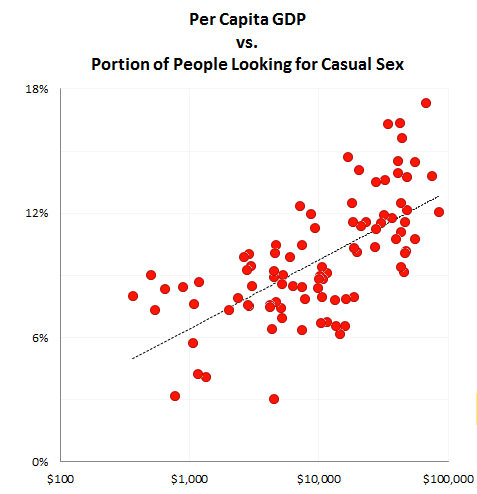OkCupid adds another report to their growing list of analyses on relationships. This time around, they look at sex and how ideas vary by demographic. The above graph shows per capita GDP versus portion of people looking for casual sex.
We were amazed at this result—money seems to be a more powerful influence on sex drive than culture or even religion.
You have, for example, Portugal, Oman, Slovenia, and Taiwan within a few pixels of each other on the right side of the graph, and Syria, Sri Lanka, and Guatemala almost stacked on the left, and all of them sit along the trend line.
Interesting as usual. What amazes me more is that so many people answer such private questions. Have any of you tried OkCupid? Are these questions part of the matching process?
See OkCupid for more findings on sex such as drive and body type and Twitter usage and commitment.
[OkCupid]


 Visualize This: The FlowingData Guide to Design, Visualization, and Statistics (2nd Edition)
Visualize This: The FlowingData Guide to Design, Visualization, and Statistics (2nd Edition)

I use OKCupid (username JessFudd2 if you’re interested). The questions are part of the matching process, but you don’t have to answer them publicly. So, other users on the site can’t see how (or if) you answered any specific question unless you choose to mark it a public.
As for why people answer really personal questions, well, we’re a bunch of single (and potentially lonely and bored) people who are often online late at night or on holidays. There are plenty of banal questions to answer as well, so it’s easy to get into a rhythm of just answering whatever pops up. That’s how I’ve answered every question on the site as of today.
My real question is this – Since most of the 3660 questions on the site are user-submitted, and many of them are terribly written, which questions are they using when they make these graphs? I’ve answered numerous questions about all of the subjects above, and some were well-written while others were nearly impossible to decipher.
I see. That makes more sense.
As for which question-picking, they most likely have a “research” question in mind, and then they look through the surveys to see what might help them find interesting answers.
To add to Jessica’s comment… the questions on OKCupid are also user submitted, and are split into a similar pattern of two followup questions: “blahblahblah. What’s your answer? What’s you ideal mate’s answer? How important is it to you they answer that way?”
there was a post on ok trends not too long ago on a slightly different topic, for which they used questions that people felt confident answering to (ie, when the question pops up, they measure the likelihood that a user will answer as opposed to skip it)
there are also sets of questions which are very correlated with one another so they would only use one
finally there are questions that strongly induce an answer which is perceived as the “right” one, and not as a true reflection of a person’s values, so those are not really covered.
I completely understand that people answer private or even intimate questions online, many of us tend to leave a lot of much more revealing data out there.
what I don’t understand is why other people sitting on a heap of voluntarily submitted, high-quality data about millions of users don’t propose a service comparable to ok trends.
@Jerome — What other people might have this kind of data?
Nathan – Hunch comes to mind as another site that collects this data in this manner, but more broadly, collecting data about your thoughts, your beliefs, your innermost ideas, your “soul” if you will, is what the internet is all about. My musings on this topic here: http://www.cenedella.com/job-search/the-digital-soul-part-iii-insights-that-are-queer-but-true/
Marc – Looks like you were dead on, considering the post today is from Hunch.
Simply fascinating stuff, isn’t it?